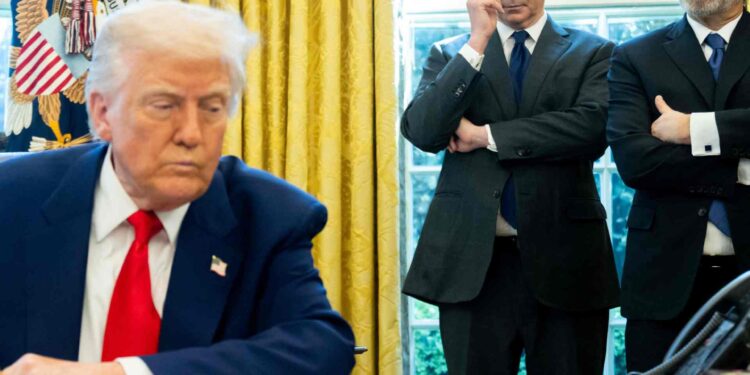In a sudden development on Wednesday evening, US President Donald Trump announced the suspension of the application of new customs duties for a period of 90 days, in a clear attempt to contain the wave of panic that swept the global financial markets after its previous escalation decisions.
The decision, which came after pressure from prominent economic and commercial circles, was not controversial within the American administration, but rather highlighted the severe division in the Trump team between supporters of the commercial escalation and its opponents.
Public disputes .. Mask and Navaru on both sides of the opposite
The most prominent division appeared in the public debate between Elon Musk, businessman and CEO of “Tesla” and “SpaceX” and the interim minister in the Trump government, commercial advisor at the White House Peter Navarro.
Musk attacked the statements of Navarro, who defended customs duties as a “drug for the American economy”, and Mask said on the “X” platform: “Peter Navaro is ignorant, and what he says can be easily refuting. Tesla is the most integrated company vertically in America.”
Navarro has mocked the suggestion of the Masc Musk for the establishment of a free trade area with Europe, saying in an interview with “Fox News”: “Elon sells cars, not an economy,” adding that “the industrial vision of the administration is based on the production of tires in Akeron, the engines in Flint, and not the collection of foreign spare parts.”
A report on Al -Jazeera English (Al -Jazeera.com) stated that Musk expressed during his conversation with Matteo Salvini, Italian Prime Minister Matteo Salvini, his hope for “reaching a zero status of fees between Europe and the United States”, in an unprecedented invitation within the Trump administration towards openness instead of escalation.
A wider division within Trump’s economic team
Confusion is not limited to Musk and Navaru, as a report by the Financial Times revealed that the Minister of Agriculture, Brooke Rollins, evaded whether the fees will be canceled or will continue, during an interview with “CNN”.
At the same time, Trade Minister Howard Lottennik confirmed that the fees “will remain in the coming weeks.”
Analysts believe that these conflicting messages confirm the absence of a unified vision within the American administration, which weakens their credibility in front of the markets.
“The contradictory messages reflect a real division, and perhaps a struggle for the future of economic policy within the White House,” economist Tim Ash said, in a blog for “RBC Blue Bay”.
The suspension of the fees is temporarily refreshes the markets .. But the ambiguity is continuing
The Bloomberg agency indicated that the American markets have regained some of their balance after announcing the suspension of fees.
The Wall Street exchange recorded a great recovery yesterday, Wednesday, which led to its main indicators.
- The Dow Jones Index increased by 7.9%
- The S & B 500 is 9.5%
- Nasdak’s index jumped by 12%.
However, according to an analysis issued by the “Goldman Sachs” bank, the suspension decision does not reflect a “real shift in the strategy”, but rather a “tactical attempt to absorb the market shock”, noting that the comment does not include all the fees, but only the second batch of China and India’s imports.
In this context, US Treasury Secretary Scott Besent said, in an interview with “NBC”, that “more than 50 countries have requested the start of immediate negotiations with Washington on the fees,” adding that “the White House is open to listening, but the decision to fully decline is not yet.”
Investing in the wind?
Despite the temporary bounce in the markets, a number of economists expressed fears that this division would lead to “eroding investor confidence.”
“Without a real decline from Trump, investors must prepare for a wide commercial link between China and America,” Michel Lam, the chief economist of the Greater China region at the Societe General Bank, told Bloomberg.
In light of the continued ambiguity, the Chinese Ministry of Commerce confirmed in a statement that it “will not back down” from its defensive steps, and said: “If America insists on its unilateral approach, then Beijing will continue to respond firmly.”



